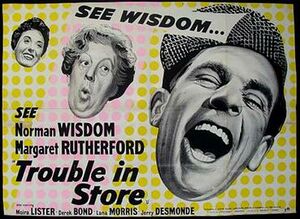Trouble in Store: Difference between revisions
No edit summary |
|||
| Line 68: | Line 68: | ||
* {{tcmdb title|93979}} | * {{tcmdb title|93979}} | ||
* {{IMDb title|0046464}} | * {{IMDb title|0046464}} | ||
{{DEFAULTSORT:Trouble In Store}} | {{DEFAULTSORT:Trouble In Store}} | ||
Revision as of 09:27, 23 December 2022
| Trouble in Store | |
|---|---|
 Original British Quad poster | |
| Directed by | John Paddy Carstairs |
| Written by | John Paddy Carstairs Maurice Cowan Ted Willis Jill Craigie |
| Produced by | Maurice Cowan Earl St. John |
| Starring | Norman Wisdom Moira Lister Margaret Rutherford |
| Cinematography | Ernest Steward |
| Edited by | Geoffrey Foot Peter Seabourne |
| Music by | Mischa Spoliansky |
Production company | |
| Distributed by | General Film Distributors Republic Pictures (US) |
Release date |
|
Running time | 85 minutes |
| Country | United Kingdom |
| Language | English |
| Budget | £125,000[1] |
Trouble in Store is a 1953 British comedy film directed by John Paddy Carstairs and starring Norman Wisdom as a department store clerk in his cinema debut. The film also featured Moira Lister, Margaret Rutherford, Jerry Desmonde and Lana Morris. For his performance, Wisdom won a BAFTA Award for Most Promising Newcomer. Although it was shown at a West End venue, the film broke box office records at 51 out of the 67 London cinemas in which it played.[2] The film was shot at Pinewood Studios with sets designed by the art director Alex Vetchinsky. It was released by Rank's General Film Distributors and was later released in America by Republic Pictures. The film's success led to Wisdom appearing in a string of films for Rank beginning with One Good Turn.
Plot
Norman (Norman Wisdom), a lowly stock clerk at Burridge's department store, is in love with another employee, Sally Wilson (Lana Morris), though he has been unable to muster the courage to let her know how he feels. After he antagonizes the new head of the store, Augustus Freeman (Jerry Desmonde), he is promptly fired. On his way out, Norman helps Miss Bacon (Margaret Rutherford) carry her bulging suitcases, unaware that she is an audacious shoplifter. Freeman sees Norman assisting a "customer" and rehires him.
Meanwhile, Peggy Drew (Moira Lister), the store's personnel manager, flirts with Mr. Freeman, while plotting with her boyfriend Gerald (Derek Bond) to rob the place. Norman is fired and rehired again and again, as his escapades somehow manage to benefit the store. He also finally becomes acquainted with Sally, chasing her down through the city streets to return her handbag. His antics make her laugh.
After his latest firing, Norman is alarmed to find the handsome, suave Gerald trying to get to know Sally better. When he goes to the man's apartment to warn him to stay away from her, Norman inadvertently uncovers the robbery plot, scheduled to coincide with a big sale the next day. But, he is unable to get Sally or anyone else to take him seriously.
Sally eventually decides to bring Norman's story to the attention of the management, but tells the wrong person, Miss Drew, and is tied up for her efforts. Norman finds her and together, they foil the thieves. Freeman takes Norman back into his employ...but not for long.
Cast
- Norman Wisdom as Norman
- Lana Morris as Sally Wilson
- Moira Lister as Peggy Drew
- Jerry Desmonde as Augustus Freeman
- Derek Bond as Gerald
- Margaret Rutherford as Miss Bacon the shoplifter
- Megs Jenkins as Miss Gibson, Norman's loyal friend in the stockroom
- Michael Brennan as Davis
- Michael Ward as Wilbur
- Joan Sims as Edna
- Eddie Leslie as Bill
- Joan Ingram as Miss Denby
- Cyril Chamberlain as Alf
- Ronan O'Casey as Eddie
- Roddy Hughes as Taffy
- Graham Tonbridge as Mr. Graham - Department Head
- Esma Cannon as Woman at cafe
Production
Jill Craigie wrote the first draft of the script, but reportedly asked that her name be removed from the credits after learning of Wisdom's participation.[3]
Reception
Box office
The film was the second most popular at the British box office in 1954.[4][5]
Critical
The Daily Mirror reviewer wrote of the film: "If you don't laugh at Norman's antics as the downtrodden worker in a big store, trying to get promotion as a window dresser, there is something wrong with your sense of fun".[6]
References
- ^ Geoffrey Macnab, J. Arthur Rank and the British Film Industry, London, Routledge, 1993, p. 222
- ^ Pratt, Vic (2003–14). "Trouble In Store (1953)". Screenonline. BFI. Retrieved 16 September 2017.
- ^ Tom Vallance Obituary:Jill Craigie, The Independent, 15 December 1999
- ^ "JOHN WAYNE HEADS BOX-OFFICE POLL". The Mercury. Hobart, Tasmania. 31 December 1954. p. 6. Retrieved 24 April 2012 – via National Library of Australia.
- ^ Thumim, Janet. "The popular cash and culture in the postwar British cinema industry". Screen. Vol. 32, no. 3. p. 259.
- ^ Family Britain 1951–1957 by David Kynaston, Bloomsbury 2009, p. 353 ISBN 978-1-4088-0083-6
External links
- CS1: abbreviated year range
- Articles with short description
- Use dmy dates from June 2016
- Articles with invalid date parameter in template
- Use British English from June 2016
- 1953 films
- Template film date with 1 release date
- IMDb title ID not in Wikidata
- 1953 comedy films
- British black-and-white films
- British comedy films
- Films directed by John Paddy Carstairs
- Films with screenplays by John Paddy Carstairs
- Films set in department stores
- Two Cities Films films
- Films shot at Pinewood Studios
- Films set in London
- Films with screenplays by Ted Willis, Baron Willis
- 1950s English-language films
- 1950s British films